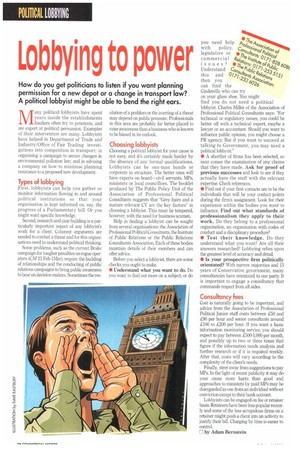lobbying to
Page 40

If you've noticed an error in this article please click here to report it so we can fix it.
Many political lobbyists have spent years inside the establishments hauliers often try to penetrate, and are expert at political persuasion. Examples of their intervention are many. Lobbyists have helped in Department of Trade and Industry/Office of Fair Trading investigations into competition in transport; in organising a campaign to secure changes in environmental pollution law; and in advising a company on how to minimise planning resistance to a proposed new development.
Types of lobbying
First, lobbyists can help you gather or monitor information flowing in and around political institutions so that your organisation is kept informed on, say, the progress of a Parliamentary bill. Or you might want specific knowledge.
Second, research and case building is a particularly important aspect of any lobbyist's work for a client. Coherent arguments are needed to combat a threat and for this organisations need to understand political thinking.
Some problems, such as the current Brake campaign for tougher penalties on rogue operators (CM 23 Feb-1Mar), require the building of relationships and the conducting of public relations campaigns to bring public awareness to bear on decision makers. Sometimes the res
olution of a problem or the averting of a threat may depend on public pressure. Professionals in this area are probably far better placed to raise awareness than a business who is known to be biased in its outlook.
Choosing lobbyists
Choosing a political lobbyist for your cause is not easy, and it's certainly made harder by the absence of any formal qualifications. Lobbyists can be one-man bands or corporate in structure. The better ones will have experts on board—civil servants, MPs, ministers or local councillors. The booklet produced by The Public Policy Unit of the Association of Professional Political Consultants suggests that "Grey hairs and a mature relevant CV are the key factors" in choosing a lobbyist. This must be tempered, however, with the need for business acumen.
Help in finding a lobbyist can be sought from several organisations: the Association of Professional Political Consultants, the Institute of Public Relations or the Public Relations Consultants Association. Each of these bodies maintain details of their members and can offer advice.
Before you select a lobbyist, there are some checks you ought to make.
• Understand what you want to do. Do you want to find out more on a subject, or do • 71 you need help prozieAss with p oli c ,legislative or iZsubon,"" Poh-ti commercial /4/0',..? /os,5,:' /O i)1' issues? •Theqc:sos: it;1ofpci6..818 Understand Cons /I/64 la -233 ic this and ,sitorvs A"lotin 15 1 then you -4'33 u2ssoci s ° ° then you -4'33 u2ssoci s ° ° can find the 26 bon; Cinderella who can try
on your glass shoe. You might
find you do not need a political lobbyist. Charles Miller of the Association of Professional Political Consultants says: "For technical or regulatory issues, you could be better off with a technical expert, maybe a lawyer or an accountant. Should you want to influence public opinion, you might choose a PR agency. But if you want to succeed at talking to Government, you may need a political lobbyist."
• A shortlist of firms has been selected, so next comes the examination of any claims that they have made. Ask for proof of previous successes and look to see if they actually have the staff with the relevant expertise. Check references.
• Find out if your first contacts are to be the individuals that will be your contact points during the firm's assignment. Look for their experience within the bodies you want to influence. Find out what standards of professionalism they apply to their work. Do they belong to a professional organisation, an organisation with codes of conduct and a disciplinary procedure?
• Test their knowledge. Do they understand what you want? Are all their answers researched? Lobbying relies upon the greatest level of accuracy and detail.
• Is your prospective firm politically orientated? With narrow majorities and 15 years of Conservative government, many consultancies have orientated to one party It is important to engage a consultancy that commands respect from all sides.
Consultancy fees
Cost is naturally going to be important, and advice from the Association of Professional Political Junior staff costs between £50 and £ 90 per hour and senior consultants around £100 to £200 per hour. If you want a basic information monitoring service, you should expect to pay between £500-1,000 per month, and possibly up to two or three times that figure if the information needs analysis and further research or if it is required weekly. After that, costs will vary according to the complexity of the client's needs.
Finally, steer away from suggestions to pay MPs. In the light of recent publicity it may do your cause more harm than good and approaches to ministers by paid MPs may be disregarded as one from an individual without conviction except to their bank account.
Lobbyists can be engaged on fee or retainer basis. Retainers have been less popular recently and some of the less scrupulous firms on a retainer might push a client into an activity to justify their bill. Charging by time is easier to control.
17 by Adam Bernstein




























































































